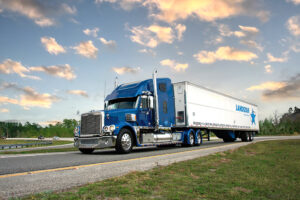Speed limiters, or engine governors, have once again become one of the hottest topics in trucking over the past several weeks.
The Federal Motor Carrier Administration (FMCSA) is again proposing to require all commercial motor vehicles (CMVs) that travel the nation’s highways as part of interstate commerce use the devices. The initial proposal, set forth in August 2016, fell by the wayside in 2017 when the incoming Trump administration mandated that work cease on all proposed rulemakings.
The FMCSA extended the comment period for its current proposal from June 3 to July 18. The comment section can be found at the Federal Register under the FMCSA’s section.
The agency has received thousands of comments so far, many of which are against the proposal.
“If you want more road rage and accidents make it mandatory for all trucks to do 65,” wrote driver Gary Bucher. “Only people that jump on a plane or a helicopter and don’t share the same (bad) roads with the peasants would think speed limiters are a good idea!”
Michael Palmer wrote: “If you limit all trucks to one set speed, lower than the speed of cars, you are likely to create a situation of having two trucks, side by side, traveling at their limited speed. Neither one being able to pass the other, creating a bottleneck of traffic. This bottleneck could cause an impatient driver of a car to take the shoulder the pass the trucks, which would be very unsafe. This will cause more safety concerns than it will fix.”
The notice does not give a specific speed limit to be set; however, it states “the agency is considering making the rule only applicable to CMVs manufactured after a certain date, such as 2003, because this is the population of vehicles for which ECUs (electronic engine control units) were routinely installed and may potentially be used to govern the speed of the vehicles.”
Additionally, the rule, if adopted, would affect CMVs “in interstate commerce with a gross vehicle weight rating (GVWR) or gross vehicle weight (GVW) of 11,794 kilograms or more (26,001 pounds or more), whichever is greater, that are equipped with ECUs capable of governing the maximum speed be required to limit the CMV to a speed to be determined by the rulemaking and to maintain that ECU setting for the service life of the vehicle.”
Among industry leaders, reactions have been mixed.
The Truckload Carriers Association (TCA) recently sent a short survey on the issue to carrier members within its Regulatory Policy Committee, Advocacy Advisory Committee, and their carrier benchmarking network (TCA Profitability Program).
Only one respondent said their fleet does not currently use speed-limiting technology, citing a high prevalence of owner-operators.
The rest of the carriers that responded shared that they do currently use speed limiters and that the devices are set anywhere from 62 to 72 mph. However, the majority of fleets that responded say they set the limiters within the upper 60s.
The majority of TCA respondents were comfortable with a 2003 model year requirement (the year floated in the list of questions provided by FMCSA for the comment period).
TCA’s Senior Vice President of Safety and Government Affairs David Heller wrote on TCA’s website that TCA staff “will review the notice and consult with our Regulatory Policy Committee in order to submit comments by the deadline…. We look forward to working with our members and FMCSA leadership to help craft a final rule that reflects TCA’s policy on speed limiters.”
TCA adopted the following stance on speed limiters in April 2021:
“The speed of all electronically governed Class 7 and 8 trucks manufactured after 1992 should be governed by tamperproof devices either limiting the vehicle to a fixed maximum of 65 mph or limiting the vehicle to 70 mph with the use of adaptive cruise control and automatic emergency braking. The Department of Transportation should conduct a recurring five-year review of speed-governing regulations to ensure that the regulations are appropriate and consistent with currently deployed technologies. Although TCA does not have a position on setting speed limiters or engine control modules (ECMs) for passenger vehicles, it recommends states consider setting the speed limiters on the vehicles of drivers with certain driving convictions.”
The Owner-Operator Independent Drivers Association (OOIDA) criticized the rule in a news release.
An OOIDA statement said policies and devices that limit speeds for large trucks “create unnecessary congestion and dangerous speed differentials among vehicles, which lead to higher accident involvement rates.”
“Studies and research have already proven what we were all taught long ago in driver’s ed classes, that traffic is safest when vehicles all travel at the same relative speed,” said OOIDA President Todd Spencer. “Limiting trucks to speeds below the flow of traffic increases interactions between vehicles which can lead to more crashes.”
Additionally, most crashes involving CMVs occur in areas with speed limits below 55 mph, mitigating the effect of any potential mandate, according to the OOIDA statement.
“What the motoring public should know is that when they are stuck behind trucks on long stretches of highway, those trucks are often limited to a speed well under the posted speed limit,” said Spencer.
American Trucking Associations (ATA) President Chris Spear said the ATA supports FMCSA’s proposal.
“ATA is pleased that the Federal Motor Carrier Safety Administration is pursuing a constructive, data-driven approach to the issue of truck speed limiters in its latest proposal,” Spear wrote in a news release.
“We intend to thoroughly review FMCSA’s proposal, and we look forward to working with the agency to shape a final rule that is consistent with our policy supporting the use of speed limiters in conjunction with numerous other safety technologies,” he added.
Many trucking companies have been using speed limiters on their rigs for years.
Walmart, for example, sets the top speed of its rigs at 65 mph.
Back at the FMCSA, officials said The National Roadway Safety Strategy has identified speed as a major factor in fatal crashes and points to speed management as a primary tool to reduce serious injuries and fatalities.
“FMCSA envisions the rule as a commonsense approach to reducing crashes and saving lives as the agency continues to work with drivers and advocates for the CMV community towards a goal of zero lives lost on our nation’s roadways,” the agency stated.
Further, FMCSA officials said that the agency “is moving forward with this rulemaking because of concerns about the number of CMV crashes and fatalities traveling at high speeds. In 2019 alone, there were nearly 900 fatal crashes in areas with posted speed limits over 70 mph.”
Linda Garner-Bunch has been with The Trucker since 2020, picking up the reins as managing editor in 2022. Linda has nearly 40 years of experience in the publishing industry, covering topics from the trucking and automotive industry to employment, real estate, home decor, crafts, cooking, weddings, high school sports — you name it, she’s written about it. She is also an experienced photographer, designer and copy editor who has a heartfelt love for the trucking industry, from the driver’s seat to the C-suite.












I for absolutely agree. I drive a limited truck and have no problems with the 4 wheelers, they pass and leave me, thus creating distance for safer driving. I have seen a lot of drivers who speed, tailgate, and don’t drive for conditions. Most of these drivers have been doing this a long time and have become complacent thinking they can go around a corner faster than the curve speed limit (which is actually set for four wheelers not trucks). Going down steep downgrades faster than the posted speed, because they can handle it, remember the driver who recently went to prison in Colorado for killing four in the mountains, he probably though he could handle it too. Tailgating a 1/2 car length from a 4 wheeler, trying to push the out of the way. I can only assume they believe they have superhuman speed, so if the 4 wheeler has to slam their brakes, the truck driver will miraculously stop on a dime and avoid an accident. If only all drivers actually followed the federal, state, and local traffic laws they probably wouldn’t be doing this but of course too many drivers think of themselves. I heard a driver say, “let law enforcement take care of the problem,” well there obviously isn’t enough personnel to do so or these scary drivers would not be doing this type of driving. It’s all about physics: Weight, how high the load is, what the load is, the weather conditions, how maintained is the equipment these all play a factor into how long it will take to stop or control the vehicle around a corner. Those who haul hazmat really pass me off when they drive like idiot because it could be way, WAY more destructive when they are in an accident. I am all for the limiters, enough said!